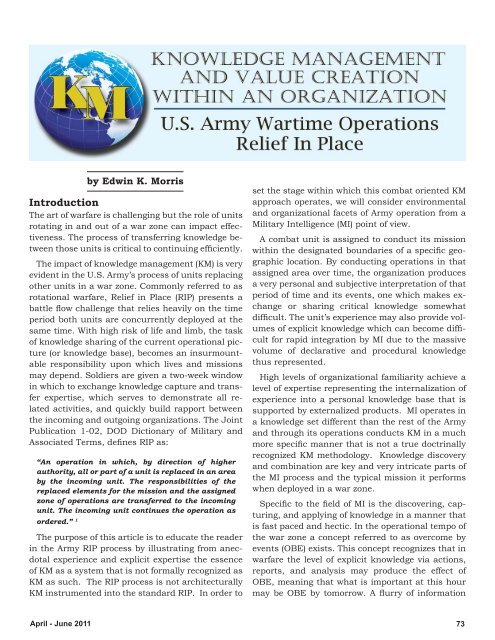George w. casey jr. - Federation of American Scientists
George w. casey jr. - Federation of American Scientists
George w. casey jr. - Federation of American Scientists
You also want an ePaper? Increase the reach of your titles
YUMPU automatically turns print PDFs into web optimized ePapers that Google loves.
y Edwin K. Morris<br />
Introduction<br />
The art <strong>of</strong> warfare is challenging but the role <strong>of</strong> units<br />
rotating in and out <strong>of</strong> a war zone can impact effectiveness.<br />
The process <strong>of</strong> transferring knowledge between<br />
those units is critical to continuing efficiently.<br />
The impact <strong>of</strong> knowledge management (KM) is very<br />
evident in the U.S. Army’s process <strong>of</strong> units replacing<br />
other units in a war zone. Commonly referred to as<br />
rotational warfare, Relief in Place (RIP) presents a<br />
battle flow challenge that relies heavily on the time<br />
period both units are concurrently deployed at the<br />
same time. With high risk <strong>of</strong> life and limb, the task<br />
<strong>of</strong> knowledge sharing <strong>of</strong> the current operational picture<br />
(or knowledge base), becomes an insurmountable<br />
responsibility upon which lives and missions<br />
may depend. Soldiers are given a two-week window<br />
in which to exchange knowledge capture and transfer<br />
expertise, which serves to demonstrate all related<br />
activities, and quickly build rapport between<br />
the incoming and outgoing organizations. The Joint<br />
Publication 1-02, DOD Dictionary <strong>of</strong> Military and<br />
Associated Terms, defines RIP as:<br />
“An operation in which, by direction <strong>of</strong> higher<br />
authority, all or part <strong>of</strong> a unit is replaced in an area<br />
by the incoming unit. The responsibilities <strong>of</strong> the<br />
replaced elements for the mission and the assigned<br />
zone <strong>of</strong> operations are transferred to the incoming<br />
unit. The incoming unit continues the operation as<br />
ordered.” 1<br />
The purpose <strong>of</strong> this article is to educate the reader<br />
in the Army RIP process by illustrating from anecdotal<br />
experience and explicit expertise the essence<br />
<strong>of</strong> KM as a system that is not formally recognized as<br />
KM as such. The RIP process is not architecturally<br />
KM instrumented into the standard RIP. In order to<br />
set the stage within which this combat oriented KM<br />
approach operates, we will consider environmental<br />
and organizational facets <strong>of</strong> Army operation from a<br />
Military Intelligence (MI) point <strong>of</strong> view.<br />
A combat unit is assigned to conduct its mission<br />
within the designated boundaries <strong>of</strong> a specific geographic<br />
location. By conducting operations in that<br />
assigned area over time, the organization produces<br />
a very personal and subjective interpretation <strong>of</strong> that<br />
period <strong>of</strong> time and its events, one which makes exchange<br />
or sharing critical knowledge somewhat<br />
difficult. The unit’s experience may also provide volumes<br />
<strong>of</strong> explicit knowledge which can become difficult<br />
for rapid integration by MI due to the massive<br />
volume <strong>of</strong> declarative and procedural knowledge<br />
thus represented.<br />
High levels <strong>of</strong> organizational familiarity achieve a<br />
level <strong>of</strong> expertise representing the internalization <strong>of</strong><br />
experience into a personal knowledge base that is<br />
supported by externalized products. MI operates in<br />
a knowledge set different than the rest <strong>of</strong> the Army<br />
and through its operations conducts KM in a much<br />
more specific manner that is not a true doctrinally<br />
recognized KM methodology. Knowledge discovery<br />
and combination are key and very intricate parts <strong>of</strong><br />
the MI process and the typical mission it performs<br />
when deployed in a war zone.<br />
Specific to the field <strong>of</strong> MI is the discovering, capturing,<br />
and applying <strong>of</strong> knowledge in a manner that<br />
is fast paced and hectic. In the operational tempo <strong>of</strong><br />
the war zone a concept referred to as overcome by<br />
events (OBE) exists. This concept recognizes that in<br />
warfare the level <strong>of</strong> explicit knowledge via actions,<br />
reports, and analysis may produce the effect <strong>of</strong><br />
OBE, meaning that what is important at this hour<br />
may be OBE by tomorrow. A flurry <strong>of</strong> information<br />
April - June 2011 73















